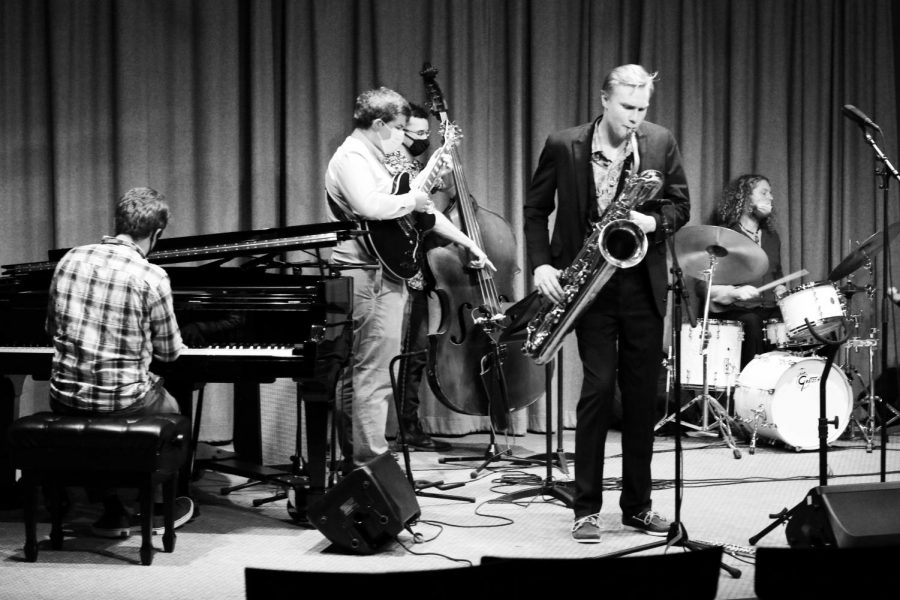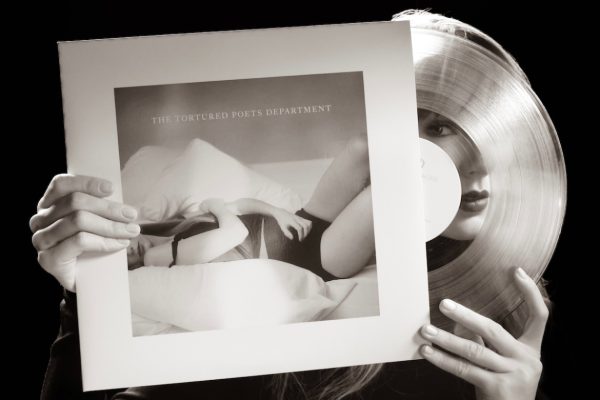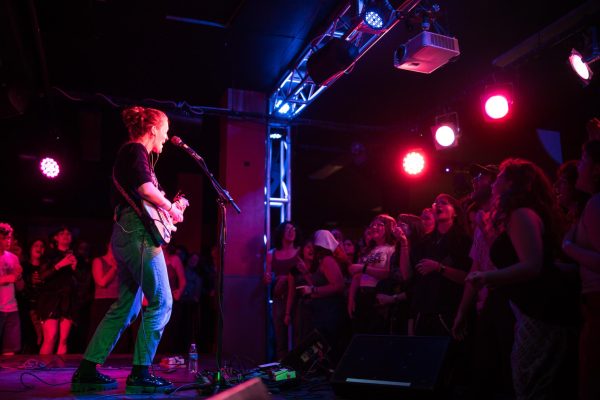Junior and Senior Recitals: Culminating a Conservatory Education
Photo by Khadijah Halliday, Photo Editor
Conservatory third-year and Saxophone major Christian Wilson performs for their junior recital in the Birenbaum Innovation and Performance Space.
From indie rock shows at the Cat in the Cream to Organ Pump’s monthly bellows throughout Finney Chapel, Oberlin is largely defined and enlivened by music. Though recent and upcoming performances from Grammy-nominated trumpeters and hip-hop icons alike warrant a tizzy, the most integral aspect of Oberlin’s music scene is undoubtedly underlined by a particularly prolific sect of Oberlin’s student body. With approximately 500 concerts on campus each year, Oberlin’s Conservatory presents a wide variety of assiduously-honed musical innovations and performances. Junior and senior recitals provide an apt opportunity for the Oberlin community to appreciate the Conservatory students’ musical genius.
Conservatory fifth-year and Jazz Piano major Matei Predescu’s senior recital paid homage to both their idols and their own artistic maturation. The curation of their repertoire reflected the vectors of their past, present, and future as a musician.
“I chose all the pieces myself,” Predescu said. “I tried to find compositions and songs from musicians that were really instrumental in my own self-discovery and in my passion for music. They’re all composers and musicians who I’ve just studied really intensely and who I really admire and respect and just form a huge part of my… artistic direction overall.”
There’s no one way to construct a performance that encapsulates years of artistic growth. Students work in close tandem with professors and peers in order to curate and actualize their repertoires, and often decide to collaborate with each other. Many student-musicians also showcase solo work within larger orchestral pieces, a tactful means of expanding the bounds of style and genre.
In light of this flexibility, many Conservatory students cook up completely signature musical recipes. Last year, double-degree fourth-year and Viola major Rituparna Mukherjee utilized her junior recital as an opportunity to hybridize her artistry and love for Lil Uzi Vert.
“I’ve been lucky enough to have a teacher who has been totally open with me playing jazz [for] my recital and really exploring what I want to do and what I want to play,” she said. “Like last year for my junior recital, I played Lil Uzi.”
Junior recitals represent a milestone of the measures and level of practice and skill improvement that the students have undergone in their previous 2–3 years. These recitals serve as Conservatory students’ first independent performance, marking a novel milestone in their collegiate music career. The process and instrumentation of these performances allow them to contemplate and solidify the trajectory of their imminent careers and artistic identity on both a private and public scale.
For their first two years, Conservatory third-year and Trumpet major Sam Atlas regarded junior recitals with a distant and daunting mysticism. Now, with their recital around the corner, they’re more prepared than they thought they would be.
“This recital is especially important to me because I’ve seen so many people get up and do their recitals before, and I have never felt anywhere near ready to do something like that,” Atlas said. “It’s always been very nerve-wracking for me to watch other people go up there and be like, ‘How am I gonna do this one day?’ But now I actually feel more ready, and I feel like I’m able to do this.”
Atlas has put in long hours to prepare for their recital, and they have no doubts about the payoff. They believe that junior and senior recitals are a necessary challenge for Conservatory students to gauge their endurance and limits as performers.
“I feel like it’s important to be able to play for a long amount of time,” Atlas said. “And that’s one of the biggest challenges with recitals for us, because we can’t play for hours upon hours. I think it’s just good practice; once you start getting older, you gain the ability to be able to play in front of more people because junior and senior recitals are definitely not just a requirement here — they’re a requirement for almost every music school.”
This year’s recitals mark a particularly exciting moment: it’s the first time many Conservatory third- and fourth-years are performing in front of a live audience since COVID-19. Students are now allowed to perform in front of a masked audience, allowing for an intimacy between performer and audience largely unachievable during Oberlin’s Zoom era.
“It’s amazing. This past weekend, so many of my friends had their recitals in person, and they were forced to have their recitals over Zoom last year,” Mukherjee said. “To get to see all of their recitals and see audiences’ live reactions in the moment — I mean, it’s unparalleled.”
Recitals open with students’ homage to their Conservatory education, reflections that often hit close to home for fourth- and fifth-years. In her senior recital this year, Mukherjee hopes to communicate the ties between music, her own identity, and larger tenets of the human condition.
“The overarching message is that we all are so special and every single human being is so important,” she said. “I guess I’m just trying to share who I am and what I love in my last performance. That’s the message that I just want people to know.”










